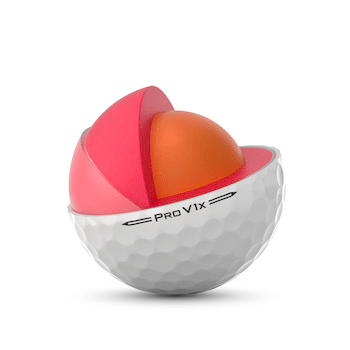Golf ball compression ratings have been misunderstood and misused for too long. Thirty years ago, compression ratings mattered. In fact, you would buy a box of golf balls and the compression rating would be right there on the box for you.
Why don’t they do that anymore?
The USGA has standardized equipment tests for golf balls and clubs. Their golf ball testing focuses on ball weight, symmetry, flight characteristics, and launch speed. The USGA DOES NOT test ball compression.
So you have to ask yourself – Why don’t they have a ball compression test?
It’s because new technology has made compression ratings practically useless! I’ll break down the reasons why, and tell you what you should focus on instead.
What is Golf Ball Compression?
First, let’s define what golf ball compression is.
It’s a measure of how much a golf ball compresses or deforms when struck by a clubface. Compression is typically expressed in a number between 0 and 200, with lower numbers indicating softer balls and higher numbers indicating firmer balls.
Many years ago, when golf balls were effectively tightly wound rubber bands with liquid cores, you needed to compress the ball down to the core in order to get the most distance out of it. A firmer ball, or a higher compression rating, would require a higher swing speed to get through it.
Low-compression golf balls took less swing speed to compress and bounce off of your club face.
Golf ball compression also translates into feel. I higher compression golf ball will feel firmer.
Why Golf Ball Compression Ratings Don’t Matter
The reality is, golf ball compression ratings are an outdated concept. New golf ball technology has made the concept obsolete.
There is no standardized test!
One manufacturer says it’s a 75 on their machine, another says it’s a 90. How do you know where a ball actually falls on the scale? If Bridgestone and Titleist have different ways of measuring, you cannot compare the two effectively.
If you are getting readings on many different golf balls from the same machine, then sure, you at least have a legitimate range for comparing different golf balls.
Well, certainly the USGA does that then, right? No, they don’t.
The wonderful folks over at MyGolfSpy do some consistent compression testing – but they even acknowledge that:
“The idea that there is a right compression for your swing speed is likely the most pervasive myth in the ball-fitting world and it has almost no basis in fact.”
All factors of golf ball performance have to be taken into consideration.
Golf ball performance comes down to spin, trajectory, and ball speed.
Let’s consider an example with a low-compression golf ball (very soft) for a higher swing speed player. Old thinking would have said this ball will be over-compressed by the higher swing speed and a significant loss of distance will occur.
Manufacturers know this, so they put an Ionomer cover on the ball that creates significantly less spin and overcomes the lower ball speed.
A proper golf ball fitting does not take golf ball compression into account. Instead, it takes trajectory, spin rate, swing speed, and a player’s preference for feel into consideration, then pairs that player with a ball which optimizes these factors for the best overall performance.
FAQs About Golf Ball Compression
Related – Best Golf Balls for Distance
Final Thoughts
Golf ball compression ratings are a myth that has been perpetuated for too long.
While they may have some relevance in the past, they are not a reliable indicator of golf ball performance today.
Instead, golfers should consider a variety of factors when choosing a ball, including spin rate, trajectory, cover material, and overall golf ball construction. With significant independent testing of golf balls at various swing speeds, we have the data to help you choose the best golf ball for your game!

Good luck on the golf course!

